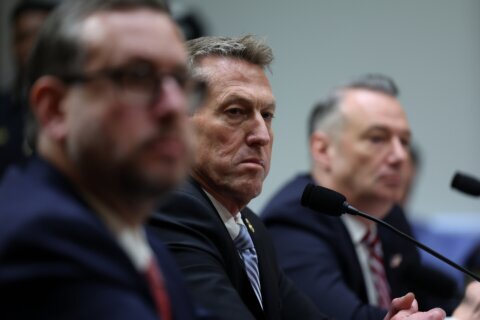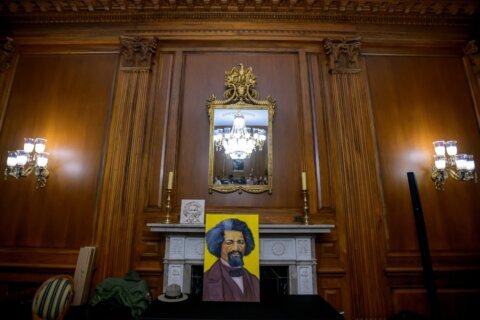WTOP will have updates throughout the day.
Watch a video livestream of the trial at around 12:30 p.m.
Listen to WTOP online, on the radio at 103.5 FM or 107.7 FM, on the WTOP app or on a smart speaker every day throughout the trial for the most up-to-date information.
The Senate trial of President Donald Trump begins in earnest Tuesday, with the White House asserting the president did “absolutely nothing wrong” and House Democrats arguing that his legal team is “dead wrong.”
The highly contentious issue of whether witnesses will testify is also far from resolved and a new rules resolution proposed by Senate Majority Leader Mitch McConnell is drawing fire from Democrats.
Despite the fierce legal and political differences playing out on Capitol Hill, all 100 senators are expected to respectfully take their seats in the upper chamber during the trial, as Supreme Court Chief Justice John Roberts presides.
What happens first?
The trial is scheduled to start each day at 1 p.m.
Senators on Tuesday need to agree on the basic guidelines for the trial, which have been set out by Senate Majority Leader Mitch McConnell in an organizing resolution he released Monday night.
Senate Minority Leader Chuck Schumer is highly critical of the resolution, arguing that it makes it harder to get four current and former White House officials to testify, including former National Security Adviser John Bolton and acting White House Chief of Staff Mick Mulvaney.
But Schumer plans to try to force votes on the issue. Democrats need four Republicans to join them to get the required 51 votes, which is not likely to happen as the trial gets underway.
McConnell has said he plans to follow the road map of the impeachment trial of former President Bill Clinton, in which a vote on witnesses was taken later in the trial. The Senate unanimously agreed on the framework for the Clinton trial, which is not expected for Trump’s trial.
Opening statements
Opening statements will begin once the framework for the trial is agreed to. If lawmakers reach an agreement Tuesday, that would mean opening statements starting Wednesday.
Under McConnell’s proposal, each side will have up to 24 hours to present their arguments over two days, though they don’t have to use all of the hours allotted. There has been discussion of possibly splitting up the openings into two 12-hour days, which could mean proceedings extending well into the night, possibly to 1 a.m. But it’s still not clear if that will take place.
The White House spelled out the arguments its legal team plans to make, in a brief submitted on Monday, which asserts that the two articles of impeachment facing the president — abuse of power and obstruction of Congress — are not impeachable offenses.
House Democrats’ case argues that the president “used his official powers to pressure a foreign government to interfere in a United States election for his personal political gain,” and that he then attempted to cover up the scheme, which involved Ukraine and its new president.
Will witnesses testify?
The issue of whether witnesses will testify is still a long way from being decided.
Democrats argue that there has never been an impeachment case — including those of other elected officials — which has not had witness testimony.
Many Republicans counter that the Senate should not have to assemble witnesses that House Democrats were unable to get during their impeachment inquiry.
But some Republicans have indicated they remain open to witnesses being called later in the trial. They include Sens. Susan Collins, of Maine; Lisa Murkowski, of Alaska; Mitt Romney, of Utah; and Lamar Alexander, of Tennessee.
Republicans hold a 53-47 advantage in the Senate, which is why Democrats need four votes to get witnesses approved.
A vote on witnesses is likely to come after opening statements are completed.
Some Republicans have said if Democrats get any witnesses they want, GOP lawmakers should get lawmakers they seek, such as Hunter Biden, the son of former Vice President Joe Biden, who served on the board of the Ukrainian company Burisma.
How long will the trial last?
That’s still unclear, especially until the issue of witnesses is decided.
The White House has at times said it hopes that the trial will end with Trump’s acquittal within about two weeks. But if witnesses are agreed to, the trial could last much longer.
Clinton’s impeachment trial lasted five weeks. It’s possible this trial could stretch into February.
The Iowa caucuses are Feb. 3. The Democratic presidential candidates — Sens. Bernie Sanders, of Vermont; Elizabeth Warren, of Massachusetts; Amy Klobuchar, of Minnesota; and Michael Bennet, of Colorado — will all have to curtail their campaigning while the trial is underway.
Also, the State of the Union address is scheduled for Feb. 4, and the White House has indicated a desire to have the trial completed before that takes place. Clinton gave his State of the Union address in 1999, during his impeachment trial.
Senators, put away the smartphones
Senators are to act as jurors in the president’s trial. Under Senate guidelines, they may not speak on the floor during the trial.
They must also forego use of their smartphones on the Senate floor. Electronic devices are prohibited in the Senate chamber during the trial.
The sergeant at arms last week announced to lawmakers that all those present must keep silent, “on pain of imprisonment.”
What about the vote on articles of impeachment?
The votes will take place on each of the individual articles of impeachment.
Trump is widely expected to be acquitted, given that it requires a two-thirds vote to convict. If he were to be convicted on either of the articles, he would be forced from office.
No U.S. president, including Clinton and Andrew Johnson, has ever been convicted and forced from office. But Johnson avoided conviction by one vote.
Trump is the first president to undergo a Senate trial for impeachment while seeking reelection.








